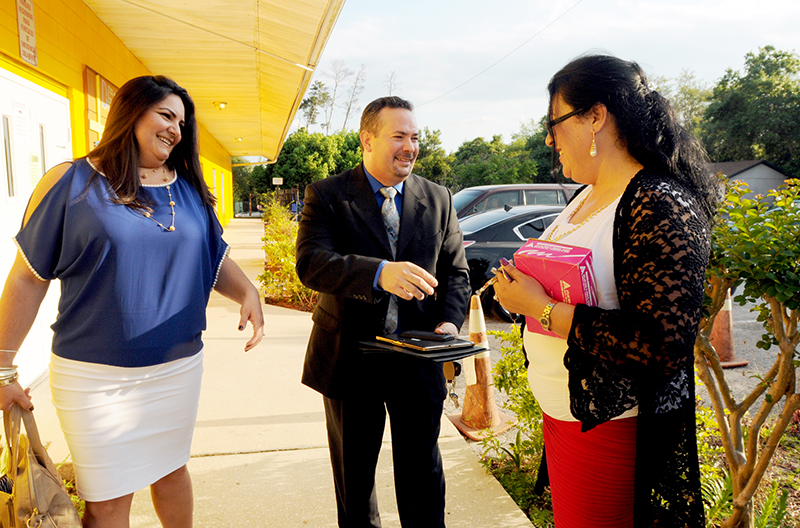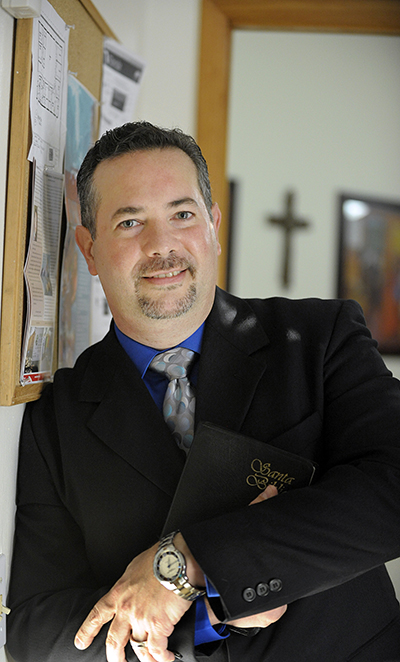Ruben Ortiz experiences deep fulfillment from his calling as a bridge builder between the church in Latin America and the United States.
But it comes at a price.
“Sometimes it’s difficult — all of the driving is causing me back problems,” Ortiz, 42, says with a laugh.
Stepping down recently as moderator of the Cooperative Baptist Fellowship of Florida isn’t likely to reduce the 20,000 miles a year Ortiz puts on his car for Fellowship and other ministries.
“I drive a lot of miles visiting churches and I have a lot of work with [CBF national] in Atlanta,” Ortiz says when pressed to list his obligations. “I am part of the [CBF] Missions Council, too.”
He also works with an organization coordinating the work of Hispanic churches from various denominations.
And as if the relentless pace of domestic and international outreach weren’t enough, Ortiz is the full-time pastor of a Hispanic church in Deltona, Fla.
His congregation has him pegged.
“One of my members said to me, ‘There’s my Superman pastor,’” Ortiz recalls.
Neither the Superman comment nor the sore back would surprise anyone at CBF, American Baptist Churches USA or elsewhere who knows Ortiz and has seen him at work. By all accounts the Cuban-born Ortiz has the energy and personality to match the passion he has for church and relationship building.
Those who have worked in a wide range of ministries with Ortiz describe him as possessing the skills and calling needed most by churches in an increasingly diverse culture.
And it doesn’t hurt that he seems to know everyone, no matter where he goes.
Relationship building
 “He is the most catalytic leader that I’ve met in a while,” says Ray Johnson, coordinator of CBF Florida.
“He is the most catalytic leader that I’ve met in a while,” says Ray Johnson, coordinator of CBF Florida.
Johnson and Ortiz met in 2007 at the annual meeting of the Puerto Rico Baptist Convention. Since then, Ortiz has thrown himself into helping Johnson and CBF Florida connect with church leaders throughout Latin America and the Caribbean.
“He was networking me with significant leaders,” Johnson says. “He knew Cuba and he was known to Puerto Rico Baptists and [Hispanic Baptists] here in Florida.”
In part through Ortiz’ connections, CBF Florida and the wider Fellowship enjoys an array of missions and disaster relief opportunities with Hispanic communities in the United States and abroad. The state group also met and was able to assist struggling Hispanic congregations in South Florida.
It’s why Ortiz now serves as CBF Florida’s Hispanic Liaison, Johnson says. In that capacity he’s helping CBF Florida explore the possibility of planting a Hispanic church in South Florida.
“Our work with Hispanics in the state of Florida wouldn’t be where it is without Ruben,” Johnson says.
Ortiz has also been invaluable to Johnson, personally.
“He has been very willing to help me as an American to understand Hispanics. My goal is to build a relationship with the broader CBF family. CBF Florida cannot do Latin American missions alone.”
‘An open passport’
The intense pace at which Ortiz conducts his ministry has its roots in a calling he describes as “reaching as many people as possible.”
And that began in Santiago, Cuba, where Ortiz was born to deeply religious parents.
His father was a pastor and, for 20 years, leader of the Eastern Baptist Convention of Cuba, which is affiliated with the American Baptist Churches USA.
Growing up, he was drawn to a career in journalism. His education took him in 1993 to Ecuador. While there, he felt a tug into some kind of ministry and expanded his studies to include theology.
In 2000 he took a job with a radio production company that catered to Hispanics living in the United States.
But even his work in radio had a missional quality to it, Ortiz says.
“I always saw the U.S. as a possibility to reach more people,” he says. “For me it was first about serving the Lord.”
Ortiz never forgot his Baptist identity, whether in Cuba, Ecuador or the United States.
“When I left Cuba, I was always looking for a Baptist church.”
Traveling abroad, he found his denominational affiliation opened doors to homes and friendships he wouldn’t have experienced otherwise.
“It’s like a family. For me, being Baptist is to have an open passport and open visa to the whole world.”
But it’s Ortiz who is the passport to Latin America and Hispanics in the United States, others say.
“He is a great leader for us at this particular time,” says Suzii Paynter, the executive coordinator of CBF.
He is helping guide the Fellowship into its value of embracing diversity, she said. That became a more intentional goal identified by the 2012 Task Force.
“It’s an area we have to get intentional about and not rely on happenstance,” she says.
The timing of Ortiz’ ministry within CBF is significant. The Fellowship recently launched a new logo and slogan, “Forming Together,” which also applies to embracing all ethnicities and cultures.
Ortiz’ style fits perfectly with that effort, Paynter says, because he avoids the liberal-verses-conservative, us-versus-them approach in his bridge- and relationship-building ministry. He also avoids the patriarchy and pride that domi-nated Western culture and missions, she said.
That’s in keeping with the Fellowship’s desire to show Hispanics that the CBF seeks “a partnership of respect and empowerment,” Paynter says.
“He has a heart for the greater Kingdom of God and he has been equipped with the gifts of reaching out and reaching across and having ideas and positive energy. He is the kind of leader people trust and follow.”
‘CBF for me is personal’
But Ortiz didn’t know much, if anything, about CBF until relatively recently.
He was raised in an ABC USA home and church. Venturing abroad he encountered Southern Baptist churches, including a Hispanic SBC megachurch in the Miami area.
When work took him to Deltona, he joined La Primera Iglesia Bautista de Deltona, or First Baptist Church. In 2002 the ABC USA congregation called him to be its pastor.
But he found the congregation to be geographically isolated from its denomination.
By then he had heard of CBF and eventually made a call to Bernie Moraga, leader at the time of the Fellowship’s Hispanic initiative.
Moraga put him in touch with Tommy Deal, then the associate coordinator of CBF Florida.
From there the relationships began expanding.
CBF national and Florida leaders helped him through a period of burnout, through a divorce (he has since remarried) and through to a new sense of calling.
And it convinced him that the Fellowship is the way to go for Hispanic Baptists.
 “CBF for me is personal, face-to-face,” he said. “They are people you can touch and you can laugh with them — it’s a community and a family.”
“CBF for me is personal, face-to-face,” he said. “They are people you can touch and you can laugh with them — it’s a community and a family.”
Deal remembers that 2004 meeting with Ortiz in College Park, Fla. Besides Deal and Moraga, there was Carlos Peralta and his wife, Miriam, both of Ecuentro Ministries.
“They were looking for community and family,” says Deal, now the disaster response director for CBF.
Ortiz and the Peraltas also made a presen-tation about Ortiz’ church and the couple’s ministry and how those could help CBF tap into their Latino connections, Deal says.
More meetings followed and eventually Ortiz invited Deal to Puerto Rico for a meeting of Baptist churches there. That’s when Deal said he knew he was with the right guy.
“He works a room,” Deal says. “He’s just a ball of energy — he just strikes up conversations with anyone.”
Then and since Deal has watched Ortiz’ personality draw in pastors and lay people from across the Baptist spectrum.
“I have been in his worship services and the preaching is dynamic, energetic and engaging.”
‘This is my family’
Ortiz said he devotes all that energy to the CBF because he sees the Fellowship, and the larger moderate Baptist movement, as the best thing for Hispanics in America.
“It is a great way for us to get connected,” he said.
Hispanics in the United States often fall prey to isolation and misunderstanding, especially concerning whether or not they are in the country legally.
While their churches provide them with the comfort of community, those congregations often live and serve in isolation, as well. Plus they are under-resourced because they are small and cannot afford full-time pastors or adequate facilities, Ortiz says.
“Like a friend said, we are a first-world ministry with a third-world budget,” Ortiz says of many U.S.-based Hispanic churches.
Another challenge, regardless of budgets, is hardship faced by undocumented immigrants.
Ortiz said his church in Deltona is made up mostly of Puerto Ricans who are in Florida legally. But they have had a couple of members over the years who weren’t and ran afoul of authorities.
“It’s a shame we don’t have a total immigration reform law,” he says.
It’s a painful situation. Stronger Hispanic churches can be a greater resource for immigrants in those situations.
“We are in the front of the battle,” Ortiz says.
Baptists in Latin America are united even across denominational lines. But in the United States they aren’t and Ortiz sees the moderate Baptist movement as the best shot at getting them there.
“I see the richness of the whole Baptist movement in the moderate movement.”
That provides the energy that propels him to drive thousands of miles a year to connect Hispanic people and churches with CBF and other Baptist leaders.
“I see the richness of the message, that holistic mission of God” by pursuing that calling, Ortiz says. “I see this as something I will fight for, because this is my family.”
— This article was first published in Herald, BNG’s magazine sent five times a year to donors to the Annual Fund. Bulk copies are also mailed to BNG’s Church Champion congregations.
